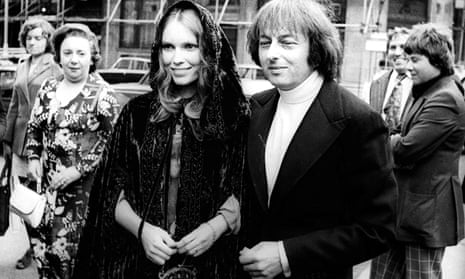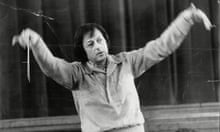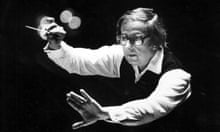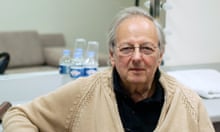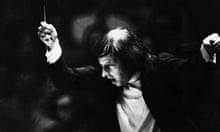In 1977, André Previn was so famous that he had his own chatshow on BBC1. In one episode, wearing an expensive-looking brown suede safari jacket with big collar, and clutching his oversize glasses in his hands, he introduces the studio audience to Jonathan Miller. They discuss Miller’s new production of The Merchant of Venice, the director going on to predict the “slow disintegration” of English theatre.
It’s a real spirit-of-the-age moment. There is no apology for the elevated tone of their conversation; the format is simple – two cultural polymaths ruminating on the arts on primetime television.
Television was a medium that the conductor understood completely. Over the previous years, he had hosted more than two dozen editions of André Previn’s Music Night, a shiny-floor light entertainment show in which the star guests were the players of the London Symphony Orchestra. Previn was the ensemble’s chief conductor. Eschewing formal concert dress for open-necked shirts and casual trousers, they performed popular classics introduced with a light touch by the maestro.
This long-running series followed Previn’s big TV breakthrough in 1971, as the straight man to Morecambe and Wise in their sketch about the Grieg Piano Concerto, with its celebrated punchline: “I’m playing all the right notes. But not necessarily in the right order.”
Classical music still has its star conductors today: Simon Rattle, Daniel Barenboim, Valery Gergiev. But when was the last time one of them was on BBC1? These days, a proliferation of channels means sumptuous coverage of the Proms on BBC4 or live concerts from Paris and St Petersburg on streaming services such as Medici.tv. But the nature of our multichannel world means audiences are inevitably relatively small. When Previn was on the main TV channel each week, several million of his audience would have discovered him by accident when idly switching over from ITV or BBC2. Some might have complained about what they saw as yet more classical music on the BBC. But a significant number would have stayed put, introduced for the first time to the riches of Ravel, Strauss or Shostakovich.
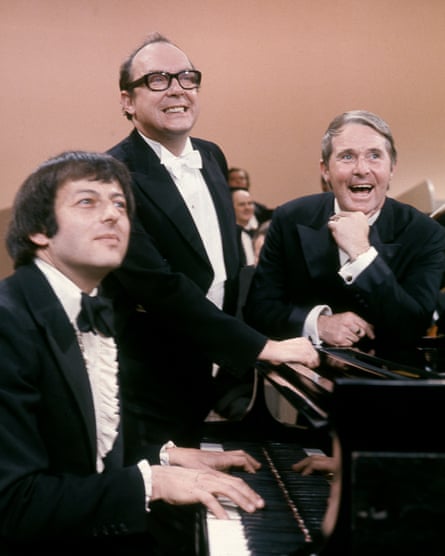
Previn had a busy orchestral rehearsal schedule the day The Morecambe & Wise Show was recorded at BBC Television Centre, but it was an opportunity he was not going to miss. The conductor would have been very well aware that Eric and Ernie’s Christmas special reached audiences of more than 25m, almost half the UK population. An appearance guaranteed immediate attention, at a level impossible to contemplate in today’s multichannel TV world.
Previn had realised the importance of celebrity early on, growing up in Hollywood. A young exile from Nazi Germany, he had little but his musical talent to help him on his way. While still a teenager, he was earning money working as an arranger and orchestrator for MGM, getting to meet the great stars of the day on the studio lot and at parties where he would play jazz piano. Before the age of 36, he had made four Oscar acceptance speeches for his work on films including Gigi and My Fair Lady. Why should he give up the glamour provided by the film world just because he wanted to become a great classical conductor?
When he took charge of the London Symphony Orchestra in 1968, he was a very contemporary kind of musical leader. His hairstyle suggested the Beatles, his fashion sense was distinctly modish, with long, monotone silk cravats and turtleneck sweaters. His then girlfriend, later wife, was Mia Farrow, who had previously been married to Frank Sinatra. Previn was a man used to photographers, press conferences and ranks of fans gathered outside stage doors. All of this he could use to promote both himself and the broader cause of classical music.
Inevitably, some of the London music critics claimed that he was a perfect example of style over substance. History proves them wrong. Previn was a major musical figure. His accounts of the Rachmaninov piano concertos and the symphonies of Vaughan Williams still see off many more recent performances. A box set of his work for CBS and RCA released last year gives some clue to his prolific nature as a recording artist – it contains 55 CDs, but is far from exhaustive; he made more than 500 recordings.
Previn’s career took the form of a carefully engineered circle. His fame reassured record industry executives that his discs would sell. Orchestras keen to increase their profiles paid him lavishly to ensure his services as a conductor. As a result, TV executives who wanted classical music in their schedules alongside news, drama and sport booked him as a host. Which only helped build his fame.
A year or so back, I was eating in a London restaurant when Simon Rattle walked in. My friend and I were excited at the idea of the celebrated new music director of the London Symphony Orchestra sitting just a few tables away. But only a few other diners looked up, most of the business-lunching clientele clearly oblivious to the presence of one of today’s great classical music stars. In Previn’s heyday, he turned heads wherever he went, with paparazzi waiting to catch him as he left concert halls or restaurants. His sheer recognisability pushed classical music up the agenda. His association with a composer or orchestra meant people took notice and he found new audiences among viewers who never before had believed Beethoven or Mozart was for them. Classical music could well use a figure of his fame and glamour again today.
